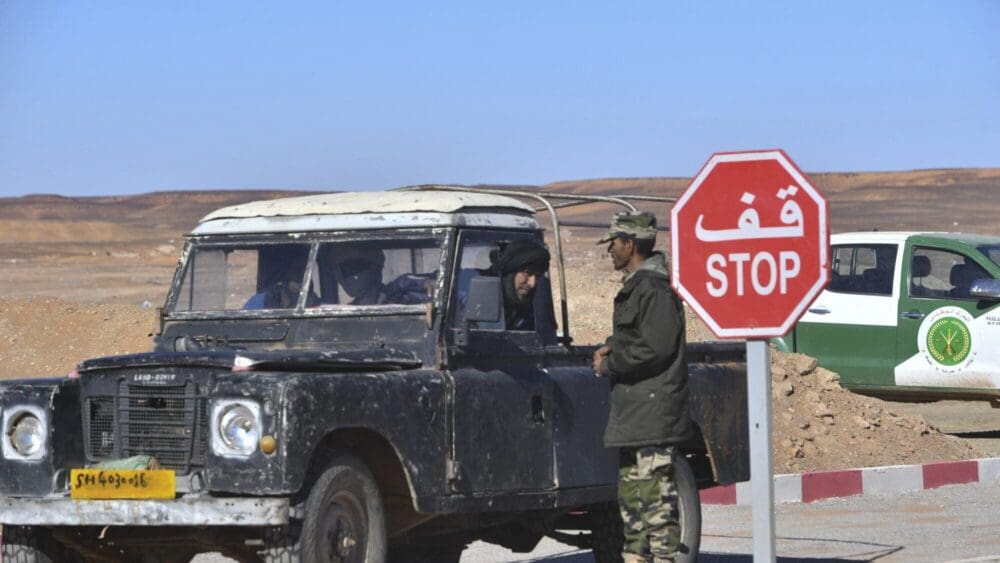
A member of the Sahrawi security forces mans a checkpoint outside the refugee camp of Dakhla
Ryad KRAMDI / AFP
France’s traditional diplomacy in North Africa attempts to strike a balance between two permanent rivals, both formerly under French domination—Algeria and Morocco. The official line has long favoured Algeria over Morocco in diplomatic disputes. Emmanuel Macron has now changed strategy, choosing to support Morocco’s claims on the Western Sahara region—also claimed by Algeria.
It is a constant feature of French diplomacy that any rapprochement with Rabat results in a cooling of relations with Algiers, and vice versa. Following the latest announcement, relations between France and Algeria rapidly deteriorated in the last days.
The Western Sahara is a former Spanish colony now mainly controlled by Morocco but claimed by the Sahrawi independence fighters of the Polisario Front, supported by Algeria. The UN considers it to be a “non-self-governing territory”. The conflict has been going on for nearly fifty years. Morocco would like to implement an autonomy plan to increase sovereignty in the region.
In February 2024, French Foreign Minister Stéphane Séjourné, on a visit to Rabat, affirmed France’s “clear and constant support” for Morocco’s autonomy plan for the Western Sahara region (described at the time as an “existential challenge” for Morocco).
For Paris, the aim of these statements was to strengthen ties with Morocco after a period of diplomatic tension. The French government just reiterated its support for King Mohammed VI in a letter dated Tuesday, July 30th, in which it states that the Moroccan plan “now constitutes the only basis for achieving a just, lasting and negotiated political solution in accordance with the resolutions of the United Nations Security Council.” Without going so far as to definitively recognise the Moroccan character of the Western Sahara, Macron says in this letter that he considers that “the present and future of the Western Sahara fall within the framework of Moroccan sovereignty.”
The French declaration was accompanied by a double rupture: between France and Algeria, and between Morocco and Algeria, whose relations were already in a bad way. Disagreements are compounded by the question of Israel, with whom Morocco has normalised its relations, while Algeria has refused to do so.
Macron’s words were interpreted as a declaration of war by the Algerian government. The Algerian government’s reaction was categorical after Macron’s letter was made public. The Algerian government announced the “immediate withdrawal” of its ambassador to France. “Algerian diplomatic representation in France is now the responsibility of a chargé d’affaires,” added foreign ministry Ahmed Attaf in a statement, denouncing a “step that no other French government had taken before.” The minister said that the withdrawal of the ambassador was only a “first step” and that other retaliatory measures would follow. He reiterated the Polisario Front’s demand for a referendum in the territory, promised since 1991 but never held. “France is defending the legitimacy of the colonial order” with this decision, according to Ahmed Attaf.The reactions from Rabat, on the other hand, were very warm. King Mohammed VI welcomed France’s “clear and strong” position. According to Le Figaro, Emmanuel Macron’s letter is the culmination of a long period of tension between France and Algeria, during which the French president has made numerous gestures of goodwill towards the territory formerly under French trusteeship—in vain.
Over the last few months, France has sent Algeria a number of signals about the possible evolution of its position on the Western Sahara, without succeeding in establishing a genuine diplomatic dialogue with the government of Abdelmadjid Tebboune, which has preferred to resist. Some Algerian elites deplore this stalemate, such as a senior civil servant interviewed by Le Figaro: “We’re still stuck in the 1970s. Algeria will never find itself facing a president as well disposed as Macron. We’ve missed a great opportunity,” he lamented.
Paris claims to have prepared for the diplomatic storm that is brewing. The direct consequences of the crisis between Algiers and Paris will be felt in the management of illegal immigrants. There is now a risk that Algiers will completely refuse to accept illegal Algerian immigrants who have been ordered to leave French territory (OQTF), and who can only be expelled with a laissez-passer issued by the Algerian authorities—making it harder for the Minister of the Interior to keep his promises of firmness on this issue.
